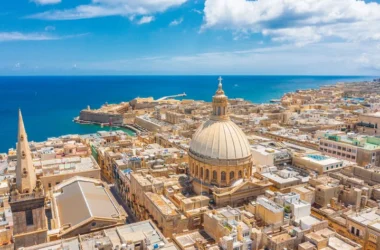Trading in Malta benefits from the its central location in the Mediterranean. The island’s strongest trade ties are with large EU economies such as Italy, Germany, France and Spain, as well as with the United Kingdom. These countries supply Malta with everything from industrial goods and food to vehicles and raw materials, while Malta exports electronics, pharmaceuticals, machinery and services back to these markets. This close relationship underlines Malta’s role as a strategic trade hub and explains why understanding these partners is essential for any business looking to import or export through Malta.
If you’re an expat or a business owner in Malta and you’re thinking about importing or exporting goods, you’ve probably realised there’s a whole world of licences, customs checks and paperwork waiting for you. Don’t panic: once you understand how Malta’s trade services work, it’s actually manageable.
Who You’ll Deal With
There are a few main players you’ll get to know before you start trading in Malta:
- Commerce Department: they handle import and export licences.
- Malta Customs : they’re in charge of duties and customs clearance.
- Regulators like MCCAA: they make sure your products meet health, safety, and environmental standards.
Importing and Exporting – The Basics
If your goods are coming from outside the EU, you’ll usually need an import licence plus customs clearance. You’ll also pay import duties and VAT (standard rate 18%). EU goods move more freely but can still require certificates depending on what they are.
For exports, licences are also common: most likely for anything sensitive like chemicals or electronics. Always check if your product needs a special permit before you send it out.
Non-EU Trade Agreements & Special Access
Some non-EU countries have special arrangments with the EU that affect how trade works in practice. For example, Turkey has had a Customs Union agreement with the EU since 1995, which means many industrials goods move with reduced or no customs duties and fewer restrictions, but only if the goods meet certain origin rules. Similarly, since Brexit, the United Kingdom and the EU operate under the Trade and Cooperation Agreement, which grants preferential access for many goods but still requires strict rules of origin and additional documentation.
Tip: It's worth checking whether your supplier's country has a similar agreement with the EU; that can change the duty or documentation burden considerably.
Mutual Agreement Procedure: Your Guide to Cross-boarder Tax Relief
VAT, Duties and Paperwork
The costs on top of your goods can be confusing. Here’s the simple version:
- Duty – charged on non-EU imports based on your goods’ classification.
- VAT – calculated on the value of the goods plus duty and shipping.
- Licences – most are free but time-limited; don’t let them expire.
Tip: classify your goods correctly (HS/TARIC codes). A customs broker can help and it’ll save you from nasty surprises.
How to Get an Import/Export Licence in Malta
If your goods are restricted or controlled, you need a licence from Malta’s Trade Services & Projects Directorate. Applications are made online at https://commerce.gov.mt, where you’ll find the list of goods, forms and any extra approvals required. Import licences usually last 8 months, export licences often only 1 month, so apply early and keep digital copies for customs clearance.
Ports and Entry Points
Malta has two main cargo hubs: Valletta Grand Harbour et Malta Freeport at Marsaxlokk. Valletta handles mixed cargo and roll on/roll off shipments. Malta Freeport is one of the busiest container hubs in the Mediterranean. Your shipping line or freight forwarder will tell you where your goods will arrive.
Why Storage Matters
Sometimes your goods reach Malta before you are ready to move them. This can be anything from electronics to furniture to food. In these cases you can use bonded warehouses or customs controlled storage. This lets you hold your goods safely and pay VAT or import duty only when they leave storage for local sale or onward shipping. It gives you time and helps your cash flow.

When Your Shipment Gets Stuck at the Port
Even if you’ve done all your paperwork, shipments sometimes get delayed at customs or in port storage, especially if customs officials need to inspect goods more closely or wait for missing certificates. When that happens, you’re not fined by Customs for the delay itself, but you will start incurring storage, demurrage, or detention fees from the shipping line or the port operator.
Here’s how it usually works in Malta:
- Customs Compliance Checks: Customs can hold a shipment for additional checks (documents, health inspections, safety or product conformity tests). This is common for foodstuffs, chemicals, and high-risk categories.
- Demurrage Fees: Shipping lines give you a “free period” to clear the container from the port. After that, daily demurrage fees apply. These are essentially “rent” for keeping the container in the port’s yard.
- Detention Fees (Container Use): If you’ve taken the container out but haven’t returned it to the shipping line’s depot in time, detention fees kick in.
- Port Storage Fees: The port itself may charge a daily storage fee for keeping your cargo or container beyond the free time.
Example: Extra Costs if a Container is Stuck at Malta’s Port
| Fee Type | Free Period (Typical) | Daily Rate After Free Period* | Example (5 Extra Days) |
|---|---|---|---|
| Demurrage (Shipping Line) | 5 days free | €55 per container/day | €275 |
| Detention (Container Use) | 7 days free | €45 per container/day | €225 |
| Port Storage (Terminal) | 5 days free | €20 per m²/day or €35 per pallet/day (varies) | ~€175 for 5 days |
You don’t pay a government “fine” for a compliance delay, but private fees escalate quickly the longer a container sits uncollected. Having everything in order before arrival is the best insurance against extra costs.
INTRASTAT in Malta
If your business moves goods between Malta and other EU countries, you may have to file INTRASTAT declarations. This is separate from Customs declarations and VAT returns.
All businesses that are trading in Malta and pass the INTRASTAT threshold have to file a monthly declaration of their arrivals and dispatches. This is not optional. It’s a legal obligation under both EU and Maltese law for statistical purposes. If you don’t file or you file late or with missing information, the National Statistics Office (NSO) can issue administrative fines. These fines can increase for repeated or serious non-compliance.
In other words, if your business buys or sells enough goods within the EU to exceed the threshold, you must register for INTRASTAT and submit the data every month.
Le ONS issues a notice every year (usually in December for the following year) setting the arrival threshold (imports from EU) and dispatch threshold (exports to EU)
Tips for Expats & New Businesses
- Get help early: a customs agent or trade consultant can guide you through the paperwork.
- Map out all costs (duty, VAT, shipping, licences) before you commit to suppliers.
- Keep your paperwork in order: licences, certificates, HS codes, all in one place.
- Check INTRASTAT annual threshold.
The Bottom Line
Trading in Malta and its system isn’t scary once you know the rules. Yes, there’s paperwork. Yes, there are fees. But once you’re set up, the process is straightforward and Malta’s location makes it a fantastic base for trade.
Start small, get advice, and you’ll be trading with confidence in no time.
If you need help to understand all these rules, our team is here to assist you. Book your 30 min free consultation today.








